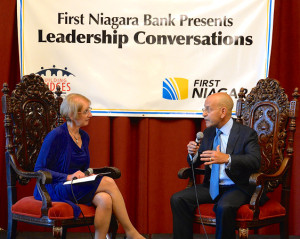When managing and integrating health care services and payments, bigger is better, the CEO of Montefiore Health System told a Westchester audience in a public conversation Monday in Purchase.
Dr. Steven M. Safyer, president and CEO of Montefiore, spoke of the Bronx-based institution”™s expansion into Westchester and its objectives, and described too a medical and administrative career rooted in the pursuit of social justice, as the guest of The Business Council of Westchester at its Leadership Conversations series at Manhattanville College. Under Safyer”™s leadership, Montefiore in the last year has acquired the bankrupt Sound Shore Health System”™s community hospitals in Mount Vernon and New Rochelle and expects final state approval this fall of a partnership with White Plains Hospital that will make Montefiore that hospital”™s parent organization and co-operator.

Similar partnerships have been announced by other community hospitals in Westchester with North Shore-LIJ Health System and NewYork-Presbyterian Hospital. “There will be more consolidations,” Safyer said in his on-stage interview with Business Council of Westchester President and CEO Marsha Gordon. “There will be more branching out of systems. There will be push and pull, but in my view, large integrated systems can fulfill the goal” of integrating care and payments that is a key element of the Affordable Care Act. “That”™s the model of the future,” he said.
In the densely populated Bronx, “A very, very important component of our strategy has been to migrate care to comprehensive, integrated care,” Safyer said. Rather than rewarding doctors for providing more care at greater costs in the old fee-for-service payment model, “Our goal is to migrate our model to one of integrative care and integrative payment” with fixed capitation payments to providers.
To do that, Montefiore needs access to patients, communities and health care providers, he said.
In business, “Scale is a big issue,” he said. “We”™re no different. ”¦ Where the scale is different for us, we have 2,000 people who manage your care.” Many of them are not professionals with advanced medical or nursing degrees, he said.
Safyer was referring to CMO, Montefiore Care Management, a management company headquartered in Yonkers that works to achieve optimal health for about 350,000 people in the Bronx and Westchester covered by commercial insurers and government-sponsored health insurance programs. Safyer said its health-promoting and cost-containment services include phone calls to patients by trained Montefiore employees to remind them to take their prescribed medications.
“In the fee-for-service system, those amenities are not rewarded, they”™re not fundable,” he said.
“Managed care has a bad name,” he said. “It earned a bad name.” For insurance companies, “It wasn”™t managing care, it was managing price and denying care, which was what made people angry.”
In Montefiore”™s managed care program, health care providers act more like insurers and Montefiore assumes all risk, he said. Compared with commercial insurers, “Our model puts us at a higher level in the premium (revenue) stream, so more money stays in the system.”
“I think we have a somewhat distinct and I think different objective in our expansion” into Westchester than other health care systems, said Safyer. While expanding scale, “It is our goal to keep care in the community” rather than send community hospital patients to Montefiore Medical Center in the Bronx, where, he  said, 25 percent of patients that now leave Westchester for treatment receive advanced-level care.
Keeping care in the community “is a very different model,” he said. “Distributive scale.”
Involved in the social justice movements of the ’60s, Safyer said he followed his mother”™s advice to take up a profession and, after considering becoming a lawyer, entered medical school at 30 with the belief “that I could make a difference” in medicine. He has been “a lifer” in his career at Montefiore and its academic center, Albert Einstein College of Medicine.
Serving in the National Health Service Corps to pay for medical school, Safyer said he was given “a three-year sentence” to Rikers Island, where he treated inmates with tuberculosis and HIV and AIDS in the early years of that health epidemic. Finding a challenge in “liberating the right resources” to counter those diseases and prevent a tuberculosis outbreak in New York City, he ended up staying eight years at Rikers.
“That led to a more administrative path” in his career, Safyer said. “Practicing good medicine wasn”™t enough. I needed resources to contain an epidemic (of tuberculosis) that everyone thought had been eliminated 100 years before.”
That career path led him to the CEO”™s seat at Montefiore in 2008.


















